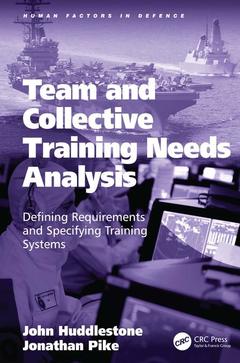Team and Collective Training Needs Analysis Defining Requirements and Specifying Training Systems Human Factors in Defence Series

Military capability is delivered operationally at a team and collective level, be it a unit as small as a squad or section, or as large as a maritime task group. Modern military forces are required to deal with a potentially wide range of missions frequently involving multiple alliance partners, within a geopolitical environment which can seem to change rapidly. Individual performance, while being important, is not the primary determinant of mission success - force integration, interoperability, adaptability and teamwork are key factors. Team and collective training which fully addresses these factors is fundamental to the development and delivery of military capability. As a consequence, the requirement to determine training requirements and specify effective systems for the delivery of team and collective training is critical to operational success.
Training Needs Analysis (also known as Front End Analysis), is a well-established methodology for analysing training requirements and specifying training solutions used extensively by the UK and its NATO partners. However, the analytical techniques employed are optimised for individual training, with little guidance being offered on its application in the team and collective context. Team and Collective Training Needs Analysis (TCTNA) has been developed to close this methodological gap. It addresses the issues of the relationship of individual and team tasks, teamwork, command and control, task and training environments, scenario definition, instructional strategy, team training approaches, instructional functions, and wide-ranging organisational and procurement considerations.
Part One of the book develops an integrated set of models which underpin the analytical approach presented in Part Two. Worked examples and case studies illustrate the application of the approach. Between 2005 and 2015 the authors worked on numerous training-related research projects at Cranfield University and Coventry University for the Human Factors Integration Defence Technology Centre and the Defence Human Capability Science and Technology Centre on behalf of the Defence Science and Technology Laboratory, UK Ministry of Defence.
Dr John Huddlestone is a Senior Research Fellow in the Human Systems Integration Group within the Engineering and Computing Faculty at Coventry University in England. His research interests include team training, training needs analysis, training methods and media and aviation human factors. Current research projects include the human factors of future flight deck technologies and single pilot operations, and the team and collective training implications of future maritime unmanned systems concepts. His research has also included the specification and evaluation of multiplayer simulation systems and the evaluation of novel training media. Before joining academia, he was a Royal Air Force Officer. Working in the training specialisation, he was responsible for the analysis, design and delivery of a wide variety of training solutions in the aviation and engineering domains. He was a member of the Human Factors Integration Defence Technology Centre team that was awarded the Ergonomics Society President’s Medal for their outstanding contribution to Human Factors research. He holds a PhD in applied psychology from Cranfield University, a Master’s degree in Computing Science from Imperial College, London and Batchelor’s Degree in Education from Nottingham Trent University.
Jonathan Pike is a freelance training specialist currently living in Perth, Western Australia. Between 2005 and 2014, while working in the Human Factors Department of Cranfield University and the Human Systems Integration Group of Coventry University, he conducted research for the Defence Science and Technology Laboratory under the auspices of the Human Factors Integration Defence Technology Centre and Defence Human Capability Science and Technology Centre. He was a member of the Human Factors Integration Defence Technology Centre team that was awarded the Ergonomics Society President’s Medal for their outstanding contribution to Human Factors research. A visiting researcher at Coventry Uni
Date de parution : 12-2015
15.6x23.4 cm
Date de parution : 05-2017
15.6x23.4 cm
Disponible chez l'éditeur (délai d'approvisionnement : 14 jours).
Prix indicatif 93,24 €
Ajouter au panierThèmes de Team and Collective Training Needs Analysis :
Mots-clés :
Training Overlay; overlay; Team Task Processes; Collective Task Analysis; Training Overlay Analysis; Training Environment Analysis; Non-Team Actors; Analysing Team Tasks; processes; Training Options Analysis; Team Task Model; Training Audience; Task Description Tables; TCTNA Process Sequence; Initial Environmental States; TNA; Individual Task Processes; Team Performance Model; Required Training Environment; CARO; Training Environment; Task Environment; Adaptive Coordination; UK Mod; Early Human Factors Analyses; Collective Training; Functional Fidelity
